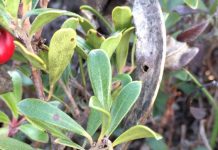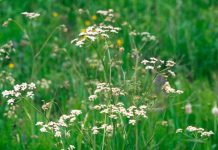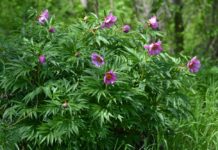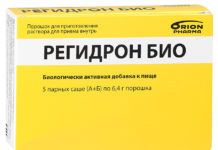Dill is a fragrant garden plant that is used not only in cooking, but also in traditional medicine, pharmaceuticals, and cosmetology. It was used as a medicinal raw material in Ancient Egypt, Greece, Persia, and India. The ancient Greeks - Hippocrates, Dioscorides advised to prepare a decoction of grass and dill seeds for the treatment of diseases of the digestive system. The smell of green dill, its graceful appearance was sung by poets - Safo, Bronzino. The most complete and detailed description of prescriptions for medicines from this plant can be found in the "Canon of Medical Science" (Avicenna). In Anglo-Saxons, dill was used to protect against magical influences. The medicinal properties and contraindications of dill are presented in our article.
Material Content:
Chemical composition, nutritional and energy value
In different parts of the plant contains more than 100 biologically active substances, vitamins and minerals. In the seeds, herbs and roots is an essential oil that gives flavor. In the seeds of it the most - 2.5 - 4%. Its complex composition determines the taste and healing properties of plant seeds. So, for example, apiol is a part of oil - the strongest antispasmodic, about which Hippocrates wrote about abortive properties.
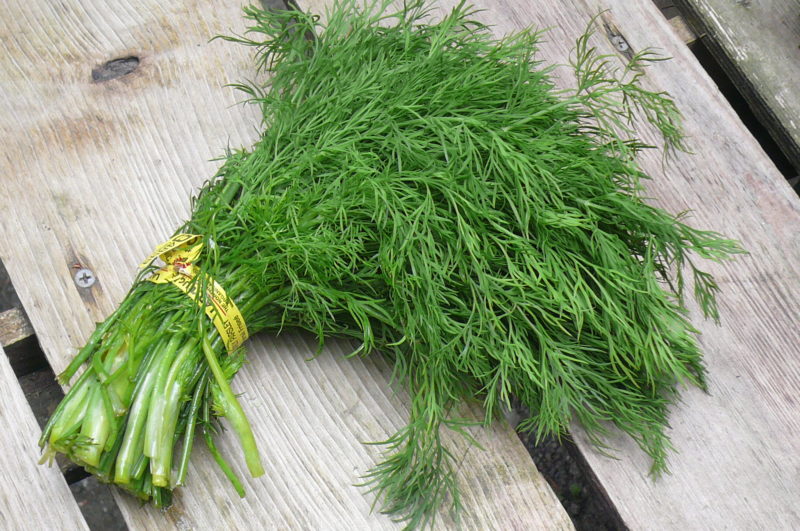
In addition, the composition of the essential oil includes:
- carvone (about 40%) - this natural substance from the class of terpenes exists in two isomers that have a different smell. The characteristic flavor of dill is attached to the (S +) isomer;
- limonene is a terpene hydrocarbon that has carcinogenic properties;
- fellandren;
- myristicin and isomyristicin.
The composition of the seeds includes 10-20% fatty oils.
Dill greens (per 100 g) contain vitamins:
- C - according to its content (52-242 mg), dill is richer than blackcurrant;
- E and β-carotene (precursor of vitamin A-3.2-12.8 mg);
- PP (3.7 mg / kg), which has two active forms - nicotinamide and nicotinic acid;
- B vitamins - B1 (1.44 mg), B2 (0.36 mg), B9 (folic acid - 2.3 mg / kg);
- P - rutin (5-100 mg).
All parts of the plant contain the necessary macronutrients:
| Macroelement name | Content (mg / 100 g of raw material) | |
|---|---|---|
| in the green part of the plant | in the seeds | |
| sodium | 4,3 | 620 |
| potassium | 335 | 1080 |
| calcium | 223 | 960 |
| magnesium | 70 | 180 |
| phosphorus | 93 | 440 |
| iron | 1,6 | - |
The rich composition of nutrients in dill seeds determines their widespread use in medicine.
The content of trace elements in the fruit is as follows:
- Manganese - 43 mg / kg;
- zinc - 33 mg / kg;
- copper - 8.7 mg / kg;
- molybdenum - 0.56 mg / kg.
100 g of dry raw materials contains (g):
- proteins - 2.5;
- fat - 0.5;
- carbohydrates - 6.3;
- dietary fiber - 2.8;
- water - 85.5.
Dill is a low-calorie product. Its energy value is 40 kcal. Therefore, nutritionists are advised to use fresh and dried dill to reduce weight.
Useful properties of dill
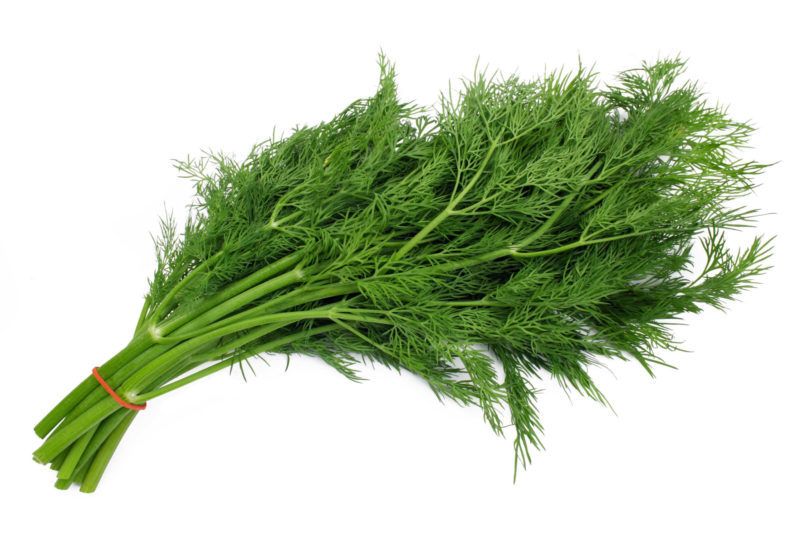
In folk medicine and pharmacology, greens and dill seeds are used as:
- soothing;
- antispasmodic;
- vasodilator;
- antiseptic;
- anti-inflammatory;
- expectorant;
- choleretic;
- diuretic (diuretic) agent.
The following pathologies are an indication for the use of decoction and dill powder, as well as fresh fragrant herbs:
- obesity;
- diseases of the liver and gall bladder;
- kidney disease
- gastritis with high acidity;
- flatulence;
- diseases of the upper respiratory tract;
- allergy;
- cramps
- migraine;
- insomnia;
- nervous excitement;
- intoxication caused by diabetes mellitus or renal diseases;
- hypochromic anemia;
- digestive disorders;
- hypertension of 1 and 2 degrees;
- ophthalmic diseases (conjunctivitis, iridocyclitis, iritis, myopia, night blindness);
- pustular skin lesions;
- pediculosis.
The benefits of dill for the human body are invaluable. No wonder dill has been widely used in the practice of treating these and many other diseases since the 3rd century. BC e. and to this day.
What is useful for women during pregnancy
Dill for a woman’s body is valuable not only in the form of raw materials for the treatment of diseases, but also as the basis for cosmetics that are easy to prepare at home.
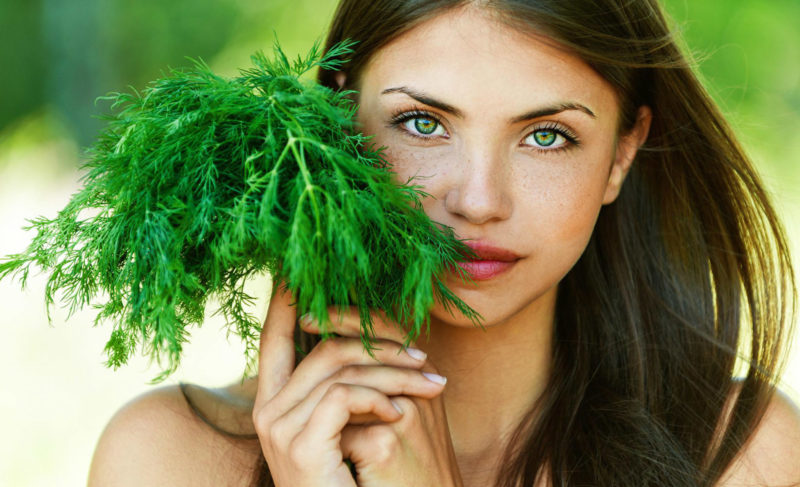
Here are some recipes that have been tested by generations of the fair sex:
- Dill, containing a large amount of terpene carvone, is used to normalize the menstrual cycle. To do this, dill greens are passed through a meat grinder, squeeze juice from the pulp and mix it with honey in a 1: 1 ratio. I drink the resulting product for 1 tbsp. l 3 times a day.
- With scanty menstruation, healers recommend taking tea from dill leaves. Fresh herbs (4 tbsp. L) pour 1 liter of boiling water. Insist in a thermos for 20-30 minutes. I drink 1 glass 3 times a day until the menstruation normalizes.
- Tea is made from flowering baskets of dill with heavy monthly and uterine bleeding of any etiology. To obtain water infusion take 1 tbsp. l baskets and pour 1 cup boiling water. Close the container, warm it and insist tea for 20 minutes. They drink the resulting broth in 1 glass 3 times a day until the bleeding stops. The same recipe is used for hemoptysis.
- For quick healing of injuries after gynecological operations, compresses and tampons can be made from the green parts of the plant, washed, boiled and passed through a meat grinder, with inflorescences.
- To normalize bowel movements (elimination of constipation), eliminate edema and flatulence during pregnancy and during lactation, infusion of dill seeds is used - 2 tsp.chop fruits, pour 2 cups boiling water and insist in a thermos or under a lid for 10 minutes. Take 0.5 cups three times a day 30 minutes before meals.
- So that during breastfeeding a woman receives milk, a decoction of seeds is prepared - 1 tbsp. l dill seed powder pour 1 cup of milk and bring to a boil. Remove from heat, insist ½ hour in a tightly closed vessel. Strain. Drink warm with honey 10-20 minutes before breastfeeding ½ cup.
During pregnancy, the dosage should be strictly observed and funds taken in short courses of 7-10 days. Prolonged use of a dill decoction can cause dizziness or an allergic reaction. Dill seed oil during gestation is forbidden to take, as it causes uterine spasm and can lead to termination of pregnancy.
In addition to medical indications, women use dill as a cosmetic product. If you prepare an aqueous infusion of fruits according to the above recipe, then applying napkins soaked in it to your eyes can eliminate redness, inflammation of the eyes, remove bags and dark circles under the eyes.
With aging and dry skin of the face, women prepare a mask for nourishing, lightening and smoothing the skin. It is prepared from 2 tbsp. l chopped dill, 1 tsp. extra virgin olive oil and oatmeal. The mask is applied in a thick layer to the cleansed face and incubated for 20 minutes. Wash off with cool water or a cooled broth of dill.
Benefit for men
In ancient Greece, dill sprigs were given to lovers, they were pinned to clothes, as it was believed that volatile, causing the aroma of greenery are an aphrodisiac that enhances sexual desire.
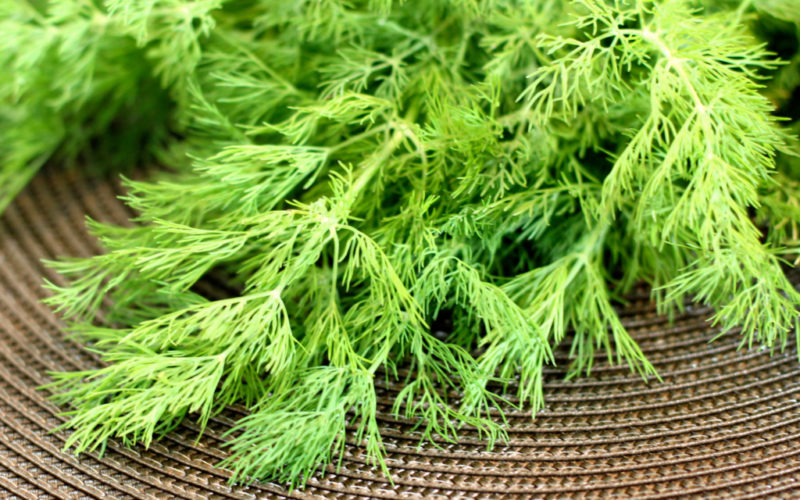
Infusion of dill seeds is recommended for men to increase potency, as it helps to dilate blood vessels and blood supply to the cavernous bodies of the penis. For the same purpose, you can use the powder from the seeds of the plant. It is recommended to take them 0.5-1 tsp. 30 minutes before meals with water.
Intensive mental and physical work, stresses in men cause increased nervous excitability, insomnia, irritability. To calm the nerves and get a good sleep 10 tbsp. l dill seeds are poured ½ liter of cahors or port, cook over low heat for 10 minutes. The resulting broth is filtered and taken in 50 ml at bedtime.
With halitosis in smoking men, you need to chew a twig of a green plant. Essential oil produces a deodorizing effect, tannins strengthen the gums, plant fibers clean and whiten teeth better than Orbit.
Bad habits, work in difficult and dangerous conditions lead to the accumulation of toxic substances in the body of men. Water infusion of dill seeds is drunk in ½ cup 30 minutes before a meal. Having a diuretic effect, the infusion cleanses the body of toxins and toxins.
The juice of the aerial part of the plant with honey (1: 1) is taken for inflammation of the prostate gland in men.
For children
Dill water from intestinal colic for infants has long been used. It is prepared from 1 tbsp. seeds filled with 1 cup boiling water, leave for 60 minutes, strain. Children dill water should take ½ cup before meals.
A decoction of dill in water is used to increase appetite in children, normalize the stomach, and colic.
From diathesis, compresses and washing of rashes with infusions of seeds in boiling water are used. The same infusion is used for colds in a child to facilitate sputum discharge.
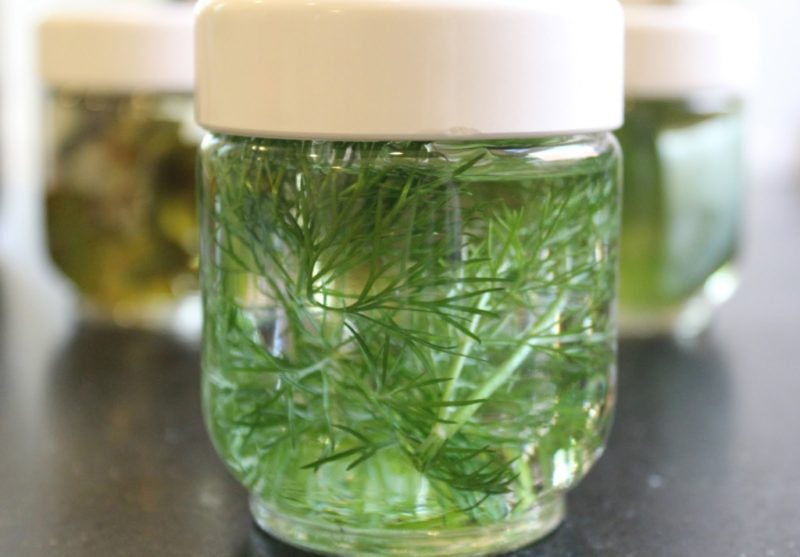
Often in children attending kindergarten or elementary school, pediculosis is detected. From lice, dill, mashed with pork fat, is rubbed into the head and covered with a plastic bag for 1-2 hours. The hair is washed with shampoo and rinsed with vodka acidified with vinegar. Comb nits and lice with a frequent comb. The procedure is repeated after 6-7 days.
With enuresis - day and night urinary incontinence in children and adults, use the juice of green dill with honey.
Dill seed powder with tansy powder, wormwood and caraway seeds taken in 1 tbsp. l used for pinworms, roundworms and other types of intestinal parasites. Children are given 1 tsp powder. before eating. The mixture is washed down with milk or water. Treatment continues until complete recovery.
The use of medicinal properties of dill
Dill is used not only for the treatment of a large number of diseases in traditional medicine. In cooking, dill greens, its seeds, essential oil are used. They also use aromatic grass in dietetics - to lose weight and improve digestion.
In folk medicine
In folk medicine, dill is used to treat diseases of all body systems.
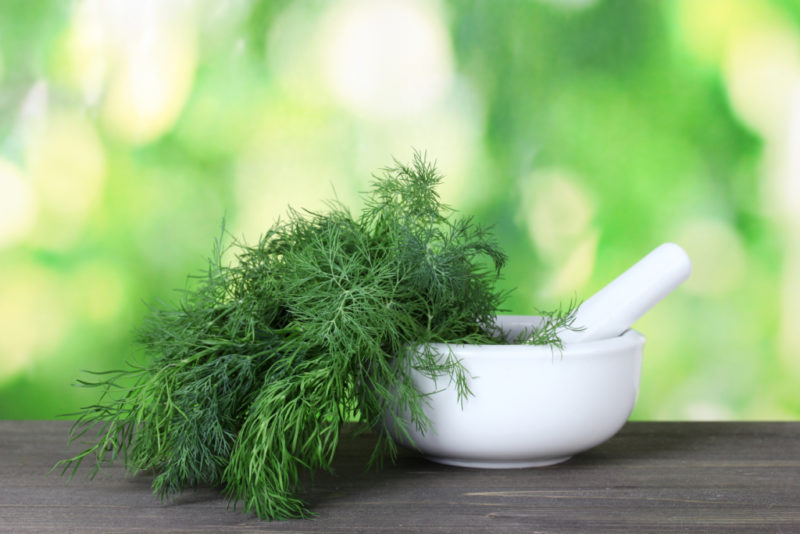
- Russian herbalists make dill water infusion from the roots of dill, which is prescribed for:
- lactation enhancement for nursing mothers;
- strengthening and expansion of blood vessels with hypertension, varicose veins;
- strengthening the heart muscle with arrhythmia, tachycardia;
- eliminate cholesterol plaques in atherosclerosis;
- with anemia;
- with inflammation of the lymph nodes;
2. Infusion of dill seeds is used as a diuretic, antispasmodic and anti-inflammatory agent for:
- jade;
- glomerulonephritis;
- urolithiasis;
- cystitis;
- urethritis;
3. Herb infusion eliminates bleeding:
- intestinal;
- pulmonary;
- hemorrhoidal;
- uterine;
- with heavy menstruation;
- nasal;
- Dental
- traumatic;
4. Painful sensations in the heart area remove dill seeds laid under the tongue, like Nitroglycerin.
5. A decoction of seeds not only reduces blood pressure, but also intraocular.
Read also: blood pressure: normal age table
6. The infusion of seeds, languishing in the Russian oven, has a carminative and choleretic effect.
7. Drink an infusion of herbs with honey to increase perspiration when:
- tuberculosis
- bronchitis;
- catarrh of the upper respiratory tract;
- ARI, ARVI;
- asthma
8. The infusion of herbs is used as an anti-inflammatory agent. As dressings, lotions and inside it is used for:
- furunculosis;
- acne;
- pustules;
- fistulas;
- ulcers;
- cuts and wounds;
- cracked skin;
- eczema
9. As baths, the infusion of green dill is recommended for:
- depriving;
- scabies;
- scrofula. For the same purposes, seed powder is used as a powder;
10. A decoction of herbs is prescribed:
- with chronic gastritis;
- ulcer of the duodenum and stomach;
- as a douching with:
- inflammation in the uterus;
- fibromyoma;
- painful periods;
- menopause.
In folk medicine, dill is used both as a raw material and together with other medicinal plants that enhance the properties of grass.
Dill seed oil is used for rubbing with pain in the back and joints, migraines, muscle spasms. It is added for inhalation in diseases of the upper respiratory tract and lungs.
Dill in cooking
In Russia, dill became widely popular in the XV-XVI centuries. The fame of crispy pickles with dill, delivered to the royal table, stepped far beyond the borders of the state. In addition to the aroma and spicy taste of dill, which dill gives to homemade preparations, it is used as a preservative for canned foods for long-term storage.
Fresh herbs, put in the first dishes, salads, aspic from meat and fish, sauces, stewed vegetables. Dry branches of dill and its fruits are used in marinades, borsch, vegetable and mushroom caviar.
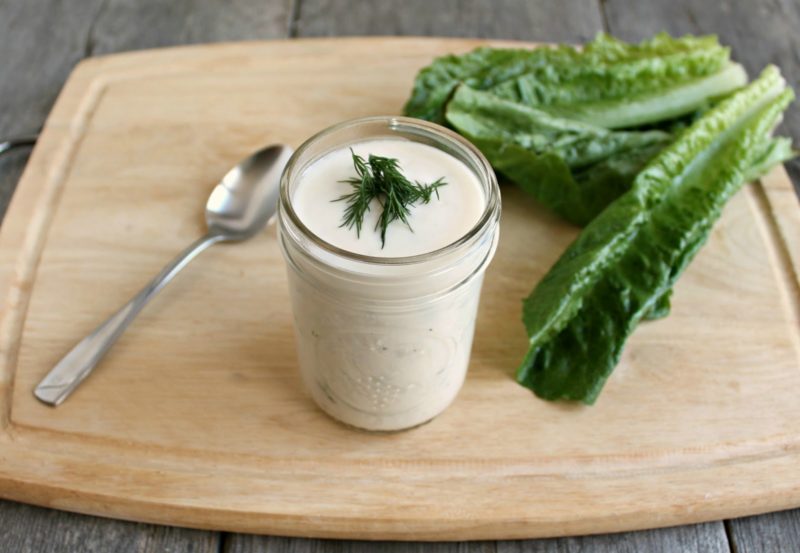
It is used for flavoring products that do not have their own pronounced smell - eggs, cottage cheese, soft cheeses.
Greens are used in the manufacture of aromatic vegetable oil and vinegar. Delicate leaves of dill, gathered in light twigs, adorn gourmet restaurant and simple homemade dishes.
Dill is one of the rare spices that can be used in the preparation of any dish and eat without restrictions.
Pancreatic benefits
Dill is used in the treatment and prevention of pancreatic diseases.It stimulates the outflow of pancreatic juice and prevents stagnation, in which gland enzymes “digest” their own tissues.
Expanding the vessels and strengthening their walls, dill prevents pancreatic ischemia, stimulates blood supply and nutrition of its tissues, promotes their regeneration.
Dill preparations relieve inflammation, prevent calcification of tissues and impaired secretory function of the gland. In chronic pancreatitis, dill is a protective agent that protects healthy cells from involving them in the pathological process.
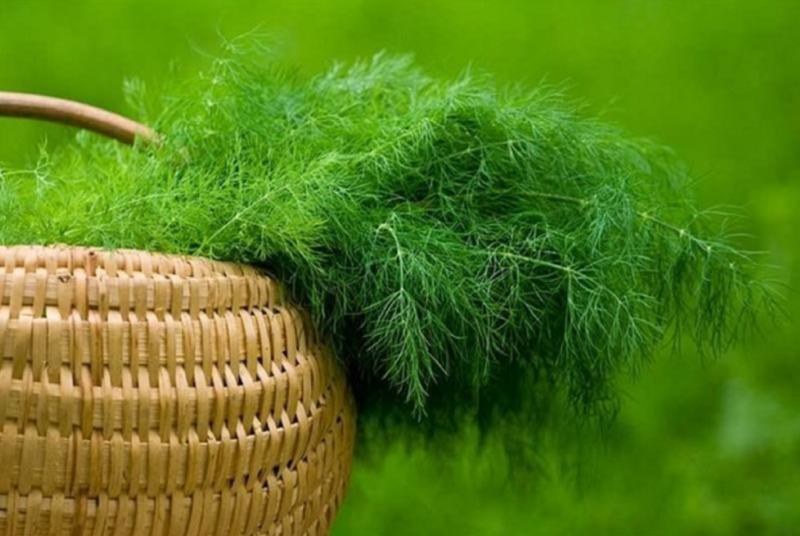
Pancreatitis is accompanied by dyspeptic disorders:
- decreased gastrointestinal motility;
- violation of the evacuation function - constipation and diarrhea;
- heartburn caused by increased acidity;
- increased gas formation;
- painful sensations.
All of these disorders can be stopped with the help of decoctions, infusions and juice of various parts of the plant.
However, dill is used only for the treatment of a chronic form of pathology. During an exacerbation of the disease, dill can not be used.
Weight Loss Application
In dietetics, dill is used as often as in the treatment of systemic diseases.
The following properties of dill are of great importance for weight loss:
- stimulation of bile and pancreatic juice for faster and more complete digestion of food;
- Improving the function of the stomach - motility and secretory activity;
- disinfection and inhibition of putrefactive and fermentation processes in the digestive tract;
- normalization of lipid (fat) metabolism - regulation of cholesterol production, breakdown of fat deposits;
- getting rid of excess fluid and swelling.
For weight loss, a decoction of dill seeds is used, its greens are added to dishes. To reduce weight, it is recommended that instead of dinner, drink a glass of 1% kefir with chopped fresh dill.
So that the salt in the dishes does not retain the liquid, it is replaced with dill seed powder. Improves the taste of diet foods and vegetable oil, infused on the leaves of dill.
In addition, following a diet, greens and dill seeds are a source of nutrients - essential micro and macro elements, vitamins. The plant has a calming effect when hunger is felt. Therefore, dry dill is added to tea to suppress appetite.
Dill seeds: useful properties
Dill seeds contain beneficial trace elements and bioactive substances much more than in greenery and roots. Therefore, the fruits are most often used in traditional medicine and pharmacology.
The essential oil used in deodorization, aromatherapy, inhalation and massage is obtained from the seeds.
Crushed seeds are added to toothpaste for the treatment of dental diseases - bleeding and strengthen gums, eliminate inflammation with gingivitis, stomatitis.
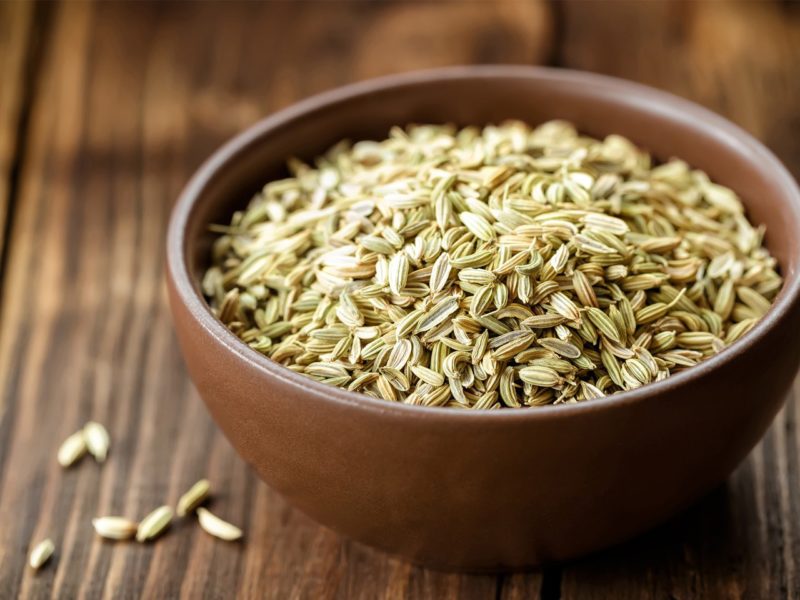
Dry seed powder is taken at the tip of a knife, washed down with a small amount of water 3 times a day with:
- insufficient secretion of breast milk;
- inflammation of the upper respiratory tract;
- stress and insomnia;
- digestion disorder;
- increased gas formation.
The infusion of seeds is used as a medicine for:
- persistent hiccups;
- diarrhea;
- cramping in the abdomen;
- bladder pain;
- vasospasm and increased permeability;
- coronary insufficiency;
- impaired heart rate;
- urinary incontinence;
- inflammation of the eyes;
- high blood pressure.
A decoction of seeds is prepared for the treatment of:
- anorexia;
- colic
- gastritis;
- chronic colitis;
- liver disease;
- gallbladder;
- hemorrhoids.
Seeds have a strong abortion effect. The medicinal effect of the fruits is more pronounced than the rest of the plant, so they should be used carefully, observing the dosage and duration of the course of therapy.
The benefits of dill water and juice
Infusion of dill fruits - dill water is used to eliminate intestinal colic in children and adults, as well as to remove gases from the intestines.
The juice of the green part of the plant is used as an anti-inflammatory and expectorant for colds and viral diseases of the upper respiratory tract, pneumonia, bronchitis, tuberculosis.

Juice relieves pain during inflammation of the urinary system. It is used in complex therapy for hematuria (bloody urine), for the treatment of uric acid diathesis.
Juice is prescribed for reduced immunity, weakness, anemia.
It has antiemetic properties, so it is drunk with intoxication caused by:
- diabetes mellitus;
- renal failure;
- liver disease;
- defeat of an uneven system.
Juice contains ascorbic acid - a powerful antioxidant. In addition, due to the high content of β-carotene and iron, juice intake is indicated for hypochromic anemia.
Contraindications and possible harm
Dill has contraindications, which are not known to many. It is believed that natural raw materials do not have side effects.
Paracelsus warned that everything is medicine and everything is poison. Only a dose makes a medicine a poison and a poison a medicine. Therefore, the use of dill should be treated with caution.
Dill preparations are not recommended for women during pregnancy, since they can cause the expulsion of the fetus in a high dosage.
It is forbidden to use dill in any form with acute inflammation of the pancreas and gall bladder. In the presence of large stones in the kidneys, urinary and gall bladder, uncontrolled intake of dill can provoke the expulsion of stones and cause injuries and ruptures of the excretory canals, their blockage.
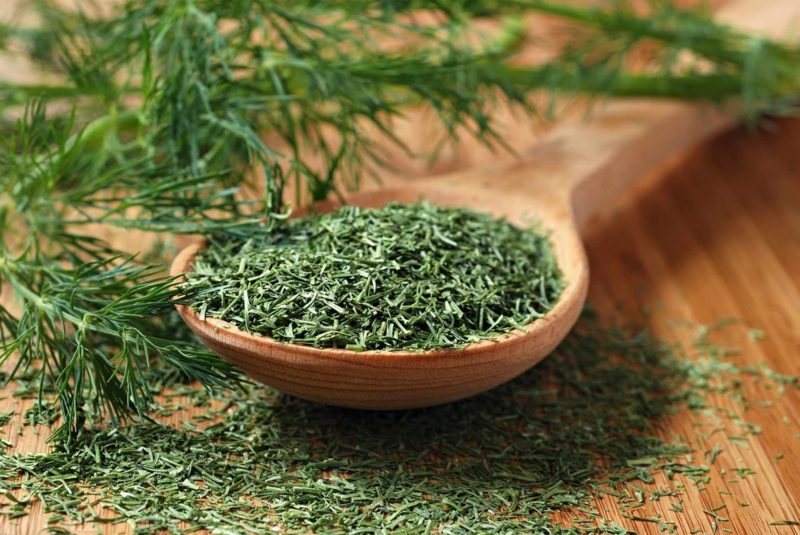
Since dill has antihypertensive properties, its preparations cannot be used for arterial hypotension - low blood pressure.
If you are prone to allergic reactions, you should conduct a skin test before using dill - apply a few drops of juice on the inside of the forearm. With individual intolerance, the plant can cause severe allergies.
Subject to all precautions - dosage, duration of administration and given contraindications, dill will help to cope with many diseases. However, it should be remembered that dill treatment can take a long time and its preparations are not used instead of drugs, but as a prophylactic and in maintenance therapy.



